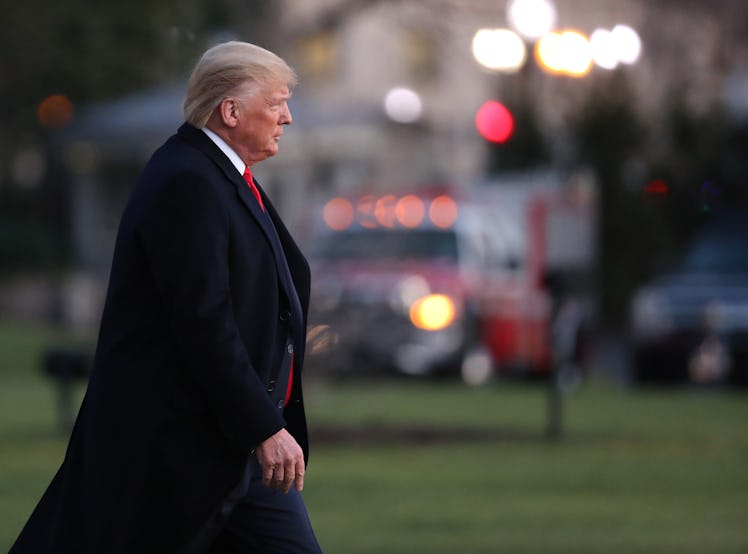
Trump Really Went Off After The House Voted To Impeach
Members of Congress have spent months debating the potential impeachment of President Donald Trump, and Wednesday, Dec. 18, was no different. But something else happened on Dec. 18 — the House of Representatives voted to impeach Trump, and the president was far from thrilled. Trump couldn't tweet during the impeachment vote because he was busy addressing a rally in Michigan, but Trump's response to the impeachment vote during the rally really went off on the whole process.
At just about 8:35 p.m. ET, Speaker of the House Nancy Pelosi announced the House had approved the first article of impeachment against President Trump, on charges of alleged abuse of power, by a vote of 230 to 197, with one "present" and three "not voting." Shortly after, the House approved the second article, on alleged obstruction of Congress, by a vote of 229 to 198, with, again, one "present" and three "not voting." Both votes came largely along party lines. The White House did not immediately respond to Elite Daily's request for comment on the House vote, though Trump previously called the articles "disingenuous" and "preposterous" in a Dec. 17 letter to Pelosi. But even at the same moment House lawmakers approved the articles of impeachment, Trump was speaking at a rally in Battle Creek, Michigan — and he was defiant as he addressed the subject.
"It doesn't really feel like we're being impeached," Trump said. "The country is doing better than ever before. We did nothing wrong, and we have tremendous support in the Republican Party."
Then, shortly after the vote took place, Trump did not immediately acknowledge that he had been officially impeached. However, he did tell the crowd in Michigan about his letter to Pelosi, and claimed the Democrats' impeachment effort "threatens to destroy what our founders pledged."
"This is the first impeachment where there's no crime," Trump said. "You know what they call it? 'Impeachment light.'"
Upon learning of the vote results, Trump zeroed in on party unity, noting that no Republicans voted against him, while a handful of Democrats voted in his favor. "We didn't lose one Republican vote," he said.
Trump also went on to accuse Democrats of having "cheapened" the impeachment process, much as he did in his letter to Pelosi. He suggested that their actions would result in tens of millions of Americans showing up at the polls to vote Pelosi out of office. Trump kept asking, "What did I do?" despite the fact that the two articles of impeachment against him detailed exactly what he had been charged with.
Trump and the White House have been critical of the impeachment process from the beginning. Ever since Pelosi announced the official launch of Democrats' impeachment inquiry on Sept. 24, Trump has slammed the impeachment process as a "hoax" and a "sham." On the eve of the House's impeachment vote, Trump sent a six-page letter to Pelosi in which he compared his treatment to the victims of the Salem Witch Trials, and accused Democrats of violating their oaths of office by trying to impeach him. Representatives of Pelosi did not respond to Elite Daily's request for comment on the letter.
While Trump was speaking in Michigan, Republican leaders slammed Democrats and the House impeachment vote. White House Press Secretary Stephanie Grisham retweeted House Minority Leader Kevin McCarthy, who objected to Democrats' reactions to the impeachment vote.
"Disgusting," McCarthy tweeted shortly after the House voted to approve both articles of impeachment. "Democrats just started cheering and applauding after the first vote on impeachment. Didn’t they claim this was supposed to be a sad and somber moment?"
Following the House's official vote, impeachment will now move on to the Senate, which has the responsibility of conducting a trial on whether to convict and remove an impeached president. Senate leaders have indicated they will not begin a trial until after the new year, and it's still up for debate what the conditions of a trial will be. Republican and Democratic leaders continue to hash out the rules, including whether they will call witnesses.